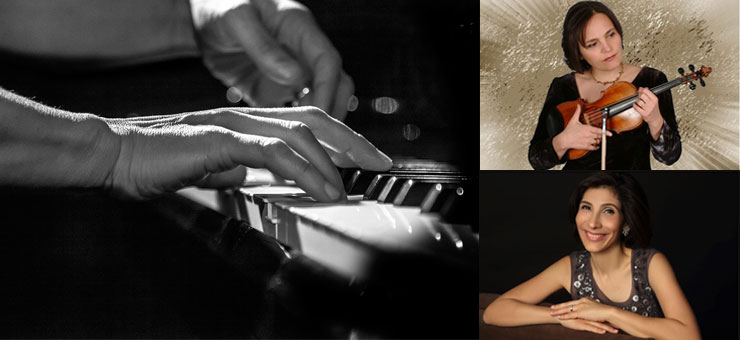
An Evening of Chamber Music
Date: Sunday 12th April 2015
Time: 6pm
Venue: Musiksalon Friedenau
Location: Bundesallee 76a 12161 Berlin
Artists: Krassimira Jeliazkova – Violin
Andion Fernandez – Mezzo-Soprano
Elizabeth Mucha - Piano

Louis Spohr
6 Lieder for voice, violin and piano, op. 154
Ludwig van Beethoven
Sonata for piano and violin No 3 in Eb Major, Op. 12
*****************************************************
Richard Wagner/Jeffrey Ching
“Wesendonck“ Sonata for female voice, violin and piano
Original songs by Richard Wagner.
Poems by Matilde Wesendonck.
Jeffrey Ching
Spohr’s Last Thoughts for mezzo-soprano,
violin scordatura and piano
I first collaborated with the Philippine-Chinese composer, Jeffrey Ching, in 2000, when flautist, Kirsten Spratt and I premiered his virtuosic composition “Taqtaq” for flutes and piano at the Philippine Embassy in Berlin. Since then, I have been looking for an opportunity to work with him again as I was greatly struck by his originality and depth of background knowledge which he brings to his compositions.
In 2012, my duo partner from my Warsaw years (2007-2010), Bulgarian violinist, Krassimira Jeliazkova moved to Berlin and we gave our first concert there in 2013, which included Mendelssohn’s F Major Sonata (to listen to the 3rd movement click here). During that visit, I renewed my friendship with Jeffrey, who had moved to Berlin on account of his marriage to one of the soloists from the Deutsche Oper, the Spanish-Philippine singer, Andion Fernandez. More pertinent to this story was that their friendship flourished after the flute/piano recital in 2000 when, in her role as the cultural attaché, Andion co-ordinated the concert at the Philippine Embassy. It seemed fated that we should all work together.
At the heart of the programme is a celebration of originality and inventiveness. Beethoven’s 3rd violin sonata, composed in 1798, although standing firmly in the classical period, already announces the unveiling of the musical creator who would forge his own path in composition. Moments of bold harmonic exploration coupled with a breadth of expression in the 2nd movement point to the unique musical language of his later works.
In the mid 19th Century, Richard Wagner, too, was considered a pioneer for his extraordinary vision as the creator of the “Gesamtkunstwerk” (total work of art) in his operas. However, very few have heard of Louis Spohr. During his lifetime, Spohr was a hugely influential figure in German music, spanning the period between Beethoven and Wagner. He was also highly acclaimed as a violinist, apparently second only to the greatest of them all, Paganini. With this hat on, he had the great privilege to play piano trios with Beethoven in 1808, but complained that Beethoven’s piano was out of tune and that the great man’s playing was careless! As a composer, he sowed the seeds for Wagner’s great operatic works by publishing a treatise in 1823 calling for opera to become more integrated: not surprisingly he became one of Wagner’s greatest champions. His treatise on violin playing, “Violinschule” catalogued the latest advances in violin playing, including the use of a new bowing technique called spiccato. What else? He invented the chin rest and introduced the practice of using a baton to conduct an orchestra and he invented rehearsal letters. He was, obviously, a man of many talents.
The concert opens with Spohr’s 6 Lieder, Op 154, for voice, violin and piano, composed towards the end of his life in 1856 and a year before Wagner immortalised Mathilde Wesendonck by setting her poems to music. As one would expect from a virtuoso violinist, the settings make great demands of the player. No 4, ‘Der Erlkönig’, in particular, known to Lieder lovers primarily through Schubert’s immortal setting, uses the violin to great dramatic effect: the violinist spins a beautiful and beguiling line while the elf king entreats the child to come with him.
The violin as virtuoso commentator is then taken up by contemporary composer Jeffrey Ching in the second half of the programme. In his arrangement of Wagner’s Wesendonck” Lieder he adds a rich violin obbligato which comments, colours and gives an instrumental weight to the songs meriting the now heftier title of ‘Sonata’ which Ching has assigned the work.
Ching’s ingenuity truly comes into its own in “Spohr’s Last Thoughts” and gives a slightly surreal twist to this evening of Germanic chamber music.
This was composed in 2009, as homage to Spohr in the 150th anniversary year of his death. Originally scored as an instrumental piece, Ching has skilfully rewritten it for mezzo-soprano, scordatura violin (re-tuned violin) and piano which has, in his opinion, heightened the more supernatural and grotesque aspects of the work.
The mezzo-soprano’s vocalise heightens the sense of being in the presence of a senile genius about to breathe his last breath and for whom words have become irrelevant, other than his own name: the singer repeats the name, ‘Spohr’ several times during the cadenza whilst the violin gives voice to memories of a lifetime of virtuosic violin playing.
